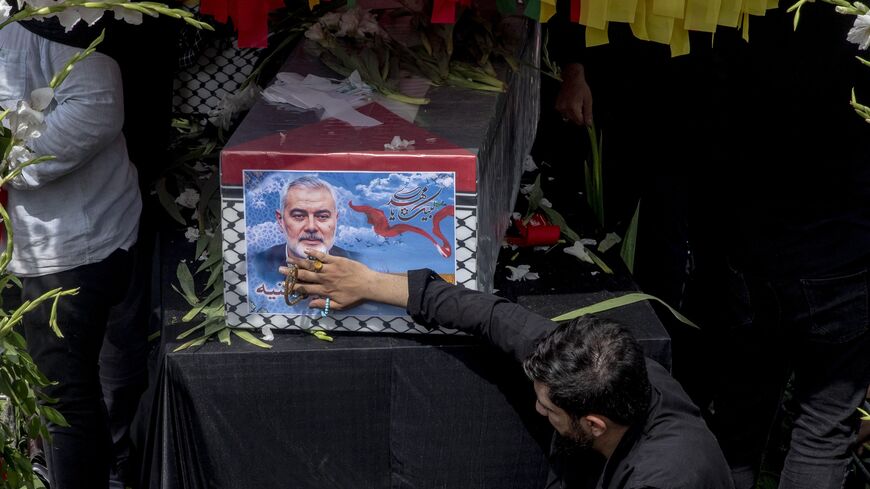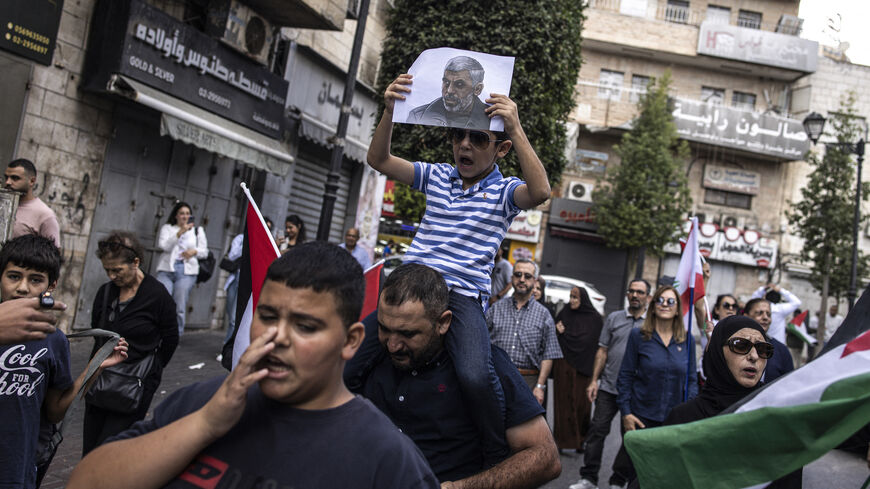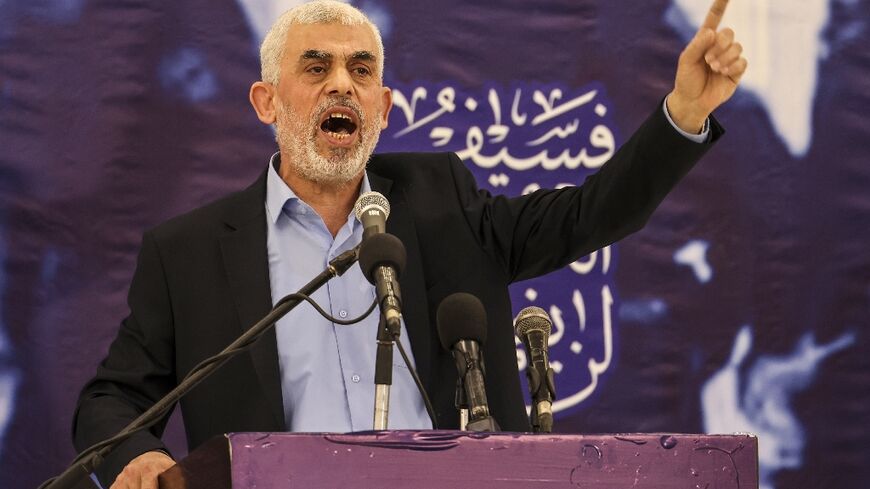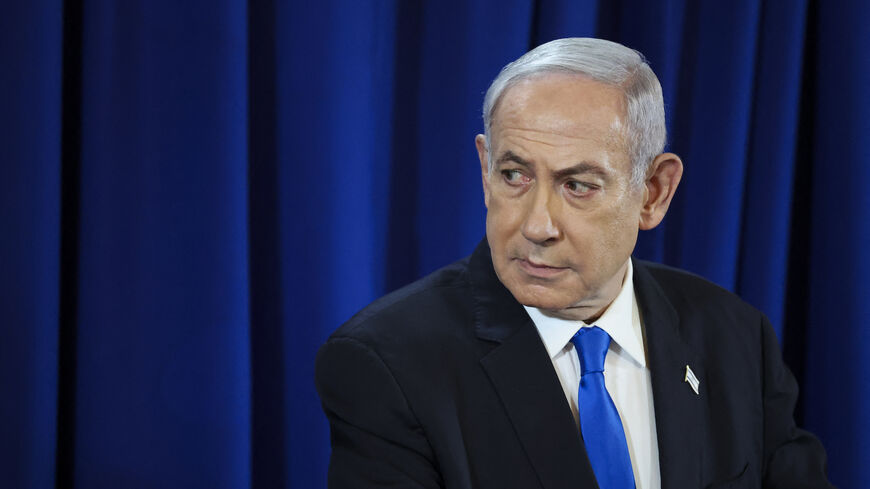Relief and loss: Palestinians in Gaza split over killing of Yahya Sinwar
The killing of Hamas leader Yahya Sinwar has provoked conflicting reactions among Palestinians in the Gaza Strip.

DEIR EL-BALAH, Gaza Strip — The killing of Hamas chief Yahya Sinwar by Israeli forces in the Gaza Strip has drawn conflicting reactions among Palestinians. While some believe that his killing may pave the way to an end of the war and bring calm to Gaza, others are deeply saddened by the loss of a leader they consider a Palestinian hero who fought the Israeli occupation to the very end.
Israel accused Sinwar of being the architect of the so-called Al-Aqsa Flood operation, in which thousands of Hamas members attacked southern Israel on Oct. 7, 2023, killing nearly 1,200 Israelis and taking over 240 others hostage.
Israeli military spokesperson said in a press conference on Thursday that a soldier from the 828th Brigade identified and killed three Hamas operatives in a firefight near Rafah in southern Gaza.
“After completing the process of identifying the body, it can be confirmed that Yahya Sinwar was eliminated,” he added.
Hamas confirmed Sinwar’s death on Friday. “The assassination of Sinwar and all our leaders will only make Hamas and our resistance stronger and more determined to continue on their path and remain loyal to their blood and sacrifices,” Hamas senior official Khalil al-Haya said in a televised speech.
Haya reiterated that Hamas will not return the Israeli captives to Israel unless the war on Gaza ends, Israeli troops withdraw and Palestinian prisoners are released from Israeli jails.
Hamas senior Basem Naim said in a press statement on Friday that Sinwar’s death is “painful and sorrowful, but the movement will triumph in the end.”
“Israel apparently thinks that killing our leaders would end our movement and the struggle of the Palestinian people. They can believe what they want, and this is not the first time they say that,” Naim added.
He stressed that Hamas is “growing in strength and popularity” with each assassination of former leaders.
Relief and pride
Muhannad al-Rais, who was displaced from Gaza City to a camp in Deir el-Balah camp in central Gaza, is relieved that Sinwar was killed. “I can’t hide my anger at Yahya Sinwar for the scourge of war he brought upon us,” he told Al-Monitor.
“Since the beginning of the war, we have been paying the price. Our children are dying, our homes are being destroyed and our life has become a daily nightmare in tents. It is true that Sinwar dealt painful blows to the Israeli occupation, but his extremist decisions brought us more pain and destruction,” he added.
“We are stuck in this war that has no end in sight, and whenever things escalate, it is because of leaders who do not think about our future or the fate of future generations,” he said.
But some Gazans believe Sinwar died a hero on the battlefield.
Habiba Radwan from Khan Younis in southern Gaza told Al-Monitor, “We thought Sinwar was hiding in the tunnels and didn’t care about our situation, but his death in combat created great sympathy for him among the people.”
Radwan, who lost three of her sons to an Israeli airstrike in April, expressed hope that Sinwar’s death would mark the end of the war. “Israel took revenge on him, so what’s left now?”
Abu Talal Qishta, 72, said, “Sinwar was martyred in the most dangerous place: in the Tel al-Sultan neighborhood in Rafah, which was evacuated more than five months ago. He was not in the tunnels or among the displaced, but on the battlefield, above the ground, fighting with the Israeli soldiers.”
“This man became an icon of the Palestinian struggle with such a death. If he had died hiding in a tunnel, he would not have received any sympathy,” Qishta said.
Will Sinwar’s death bring end to war?
According to Mustafa Barghouti, secretary general of the Palestinian National Initiative, Sinwar’s killing does not mean the end of the Palestinian resistance to the Israeli occupation.
“The event that Sinwar created on Oct. 7 was not the beginning of the conflict, because the beginning of this conflict dates back to 1948, when the state of Israel was established on the ruins of Palestinian villages and cities from which Palestinians were expelled and continue to be expelled to this day,” Barghouti told Al-Monitor.
He called blaming Sinwar for the war “victim blaming," saying, "If the Israeli occupation had ended before, there would not have been [leaders] like Sinwar or [resistance groups] like Hamas.”
Barghouti added, “Oct. 7 must be seen as a result, not a cause. It is a result of the oppression, persecution, ethnic cleansing, occupation, settlement activities and murder that the Palestinians have been subjected to for decades.”
Ahmad Rafiq Awad, a media professor at Al-Quds University, has a different view. He said, “Hamas received a painful blow with the martyrdom of its leader Yahya Sinwar and many of its former leaders, including political bureau chief Ismail Haniyeh and his deputy Saleh al-Arouri.”
Speaking to Al-Monitor, Awad explained that these blows break the chain of communication between Hamas’ command and executive institutions and affect the group’s ability to make decisions.
He believes the next stage will be very difficult for Hamas, “so it must show greater flexibility in any upcoming cease-fire negotiations. Otherwise, obstructing any negotiations and taking hardened [positions] will threaten the existence of Hamas and its survival in the Palestinian political scene, as Israel will not hesitate to assassinate more of its political leaders.”
According to Awad, Hamas will not immediately choose a new chief because communication among its components has become difficult. “Perhaps Hamas may not disclose the identity of its new leader, or may even choose a group of several leaders instead of a single person.”
Commenting on whether Sinwar’s killing would lead to an end of the war, Awad said, “This decision is solely in Israel’s hands because it is the one who refuses to leave Gaza. But I think there is a chance to end the war after Sinwar’s killing.”









